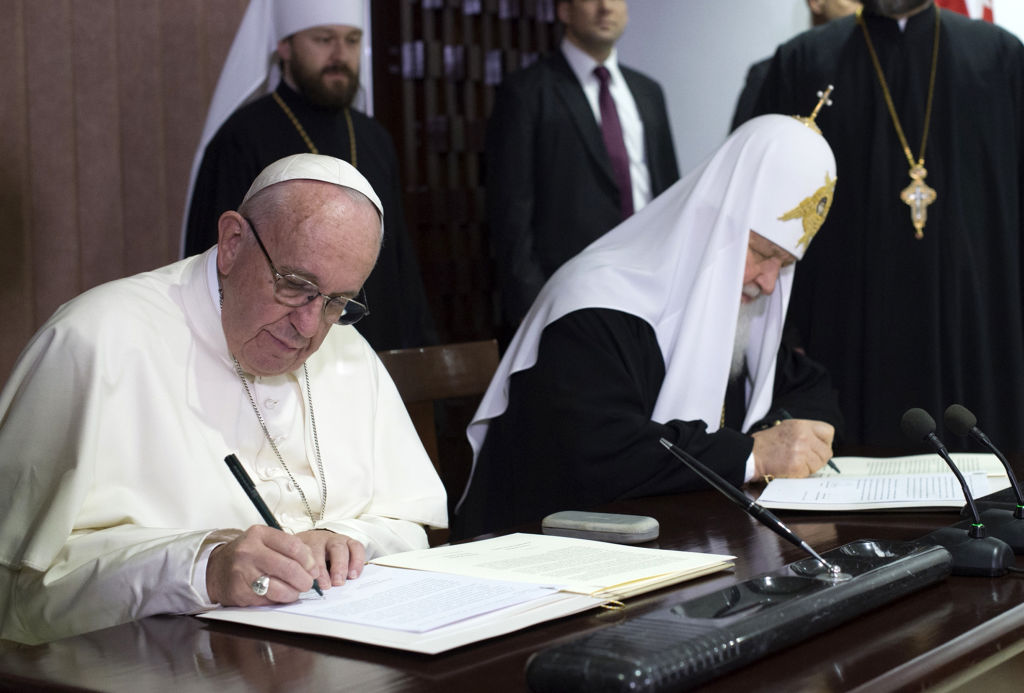Pope says Russian Orthodox patriarch shouldn't act like 'Putin's altar boy'


A free daily email with the biggest news stories of the day – and the best features from TheWeek.com
You are now subscribed
Your newsletter sign-up was successful
Pope Francis said in an interview published Tuesday that he told Patriarch Kirill — the leader of the Russian Orthodox Church — not to "transform himself into Putin's altar boy," CNN reported Wednesday.
Francis told the Italian newspaper Corriere della Sera that he spoke with Kirill via Zoom for around 40 minutes on March 16. "The first 20 minutes he read to me, with a card in hand, all the justifications for war," Francis said.
"I listened and told him, 'I don't understand anything about this. Brother, we are not clerics of state, we cannot use the language of politics but that of Jesus,'" the pontiff continued.
The Week
Escape your echo chamber. Get the facts behind the news, plus analysis from multiple perspectives.

Sign up for The Week's Free Newsletters
From our morning news briefing to a weekly Good News Newsletter, get the best of The Week delivered directly to your inbox.
From our morning news briefing to a weekly Good News Newsletter, get the best of The Week delivered directly to your inbox.
Francis also confirmed that the two clerics had agreed to postpone a face-to-face meeting in Jerusalem that had been scheduled for June. "It could be an ambiguous signal," the pontiff explained.
The Roman Catholic Church — of which Francis is head — split with the Eastern Orthodox Church in 1054. Eastern Orthodoxy comprises between 14 and 16 autocephalous (self-headed) churches, of which Kirill's Russian Orthodox Church is by far the largest.
The week before his Zoom call with Francis, Kirill, a close ally of Russian President Vladimir Putin, described the war in Ukraine as a "metaphysical" struggle against a godless international order based on "excess consumption" and "gay parades."
Francis has repeatedly called for peace in Ukraine. Last month, he kissed a flag from the Ukrainian city of Bucha and lamented the "horrendous cruelty" Russian soldiers showed to Bucha's civilian population.
A free daily email with the biggest news stories of the day – and the best features from TheWeek.com
Grayson Quay was the weekend editor at TheWeek.com. His writing has also been published in National Review, the Pittsburgh Post-Gazette, Modern Age, The American Conservative, The Spectator World, and other outlets. Grayson earned his M.A. from Georgetown University in 2019.
-
 What to know before filing your own taxes for the first time
What to know before filing your own taxes for the first timethe explainer Tackle this financial milestone with confidence
-
 The biggest box office flops of the 21st century
The biggest box office flops of the 21st centuryin depth Unnecessary remakes and turgid, expensive CGI-fests highlight this list of these most notorious box-office losers
-
 The 10 most infamous abductions in modern history
The 10 most infamous abductions in modern historyin depth The taking of Savannah Guthrie’s mother, Nancy, is the latest in a long string of high-profile kidnappings
-
 Judge blocks Hegseth from punishing Kelly over video
Judge blocks Hegseth from punishing Kelly over videoSpeed Read Defense Secretary Pete Hegseth pushed for the senator to be demoted over a video in which he reminds military officials they should refuse illegal orders
-
 Trump’s EPA kills legal basis for federal climate policy
Trump’s EPA kills legal basis for federal climate policySpeed Read The government’s authority to regulate several planet-warming pollutants has been repealed
-
 House votes to end Trump’s Canada tariffs
House votes to end Trump’s Canada tariffsSpeed Read Six Republicans joined with Democrats to repeal the president’s tariffs
-
 Bondi, Democrats clash over Epstein in hearing
Bondi, Democrats clash over Epstein in hearingSpeed Read Attorney General Pam Bondi ignored survivors of convicted sex offender Jeffrey Epstein and demanded that Democrats apologize to Trump
-
 El Paso airspace closure tied to FAA-Pentagon standoff
El Paso airspace closure tied to FAA-Pentagon standoffSpeed Read The closure in the Texas border city stemmed from disagreements between the Federal Aviation Administration and Pentagon officials over drone-related tests
-
 Judge blocks Trump suit for Michigan voter rolls
Judge blocks Trump suit for Michigan voter rollsSpeed Read A Trump-appointed federal judge rejected the administration’s demand for voters’ personal data
-
 US to send 200 troops to Nigeria to train army
US to send 200 troops to Nigeria to train armySpeed Read Trump has accused the West African government of failing to protect Christians from terrorist attacks
-
 Grand jury rejects charging 6 Democrats for ‘orders’ video
Grand jury rejects charging 6 Democrats for ‘orders’ videoSpeed Read The jury refused to indict Democratic lawmakers for a video in which they urged military members to resist illegal orders
